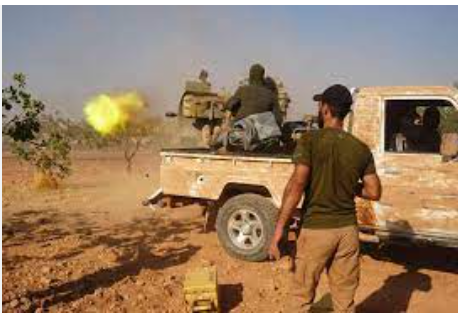Clashes continued on Thursday between the Kurdish-led Syrian Democratic Forces (SDF) and Arab tribal fighters formerly allied with them, despite the SDF saying the previous day that it had ended operations.
The clashes in the eastern Syrian province of Deir az-Zour have been going on since August 27th and were sparked by the SDF detention of the Deir az-Zour military council’s leader Ahmed Khbeil, also known as Abu Khawla.
At least 90 people have been killed. The SDF accused Khbeil of trafficking in drugs and ties to the Syrian regime of President Bashar al-Assad.
Local media activist Wisam Al-Akidi told The New Arab’s Arabic-language sister site Al-Araby Al-Jadeed that clashes were taking place in the town of Dhiban east of Deir az-Zour as well as in villages to the east and west of Deir al-Zour.
The violence comes amid days of separate clashes in Kurdish-held parts of neighbouring Deir Ezzor province after US-backed, Kurdish-led fighters detained the head of a local military body there.
Rami Abdel Rahman, head of the Syrian Observatory for Human Rights, reported “18 dead among the (pro-Turkish) factions and five from the regime forces” in Hasakeh province on Sunday, adding that others were wounded.
The clashes took place in the Tal Tamr area in the province’s northwest, according to the Britain-based Observatory, which relies on a wide network of sources inside Syria.
Factions from the coalition of Ankara-backed rebel groups known as the Syrian National Army had sought to infiltrate the region earlier in the day, it added.
Tribal leaders said the clashes broke out because they have long been deprived of their oil wealth after the SDF took control of Syria’s biggest oil wells since the departure of ISIL. The tribal leaders complained that their areas are neglected in favour of Kurdish-majority areas.
Joshua Landis, director of the Center of Middle East Studies at the University of Oklahoma, says the situation is likely to escalate and “the costs will only go up”.
Growing distrust
Several Arab activists and members of the Deir Az Zor Military Council told Al Jazeera the divide was because of “discrimination” by the SDF against the Arab population of the region.
“The arrest of Abu Khawla is not the reason behind the uprising. That was merely a spark for Arab tribesmen to act,” said Abu Hassan al-Dairi, an activist from Deir Az Zor, who claimed that Abu Khawla did not support the Arab tribesmen or respect their leaders.
Ankara painted the clashes as terror organization PKK attacking native Sunni Arab tribes to expand its zone of influence. Ankara consider the autonomous Syrian Kurdish entity YDP/YPG as a front for PKK. As SDF moved South, Turkey’s proxies took advantage of the vacuum, to attack Kurdish majority settlements. According to some Syrian sources, an incursion of pro-Turkey Arab fighters to Manbij had been interrupted by Russian air force bombing.
“Türkiye reiterates calls on friendly and allied countries to stop aiding PKK/YPG terrorists as unrest in Syria’s eastern Deir el-Zour between Arab local tribes, terrorist group continues to disrupt peace and stability in the war-torn country”, reacted pro-government daily SABAH.
Continued fighting could draw in Assad’s forces to “liberate” Areab tribes and help ISIS recover from its slump.
The terrorists lost their last sliver of land in eastern Syria in 2019, but fugitive cells hiding in the region have continued low-level attacks, killing dozens over the years.
The latest clashes in Deir Ezzor “present an opportunity for Daesh cells that nest in the Euphrates River valley to emerge,” said Myles Caggins, senior fellow at the New Lines Institute, a think tank in Washington.
Press sources, PA Turkey
Follow our English language YouTube videos @ REAL TURKEY: https://www.youtube.com/channel/UCKpFJB4GFiNkhmpVZQ_d9Rg
And content at Twitter: @AtillaEng
Facebook: https://www.facebook.com/realturkeychannel
